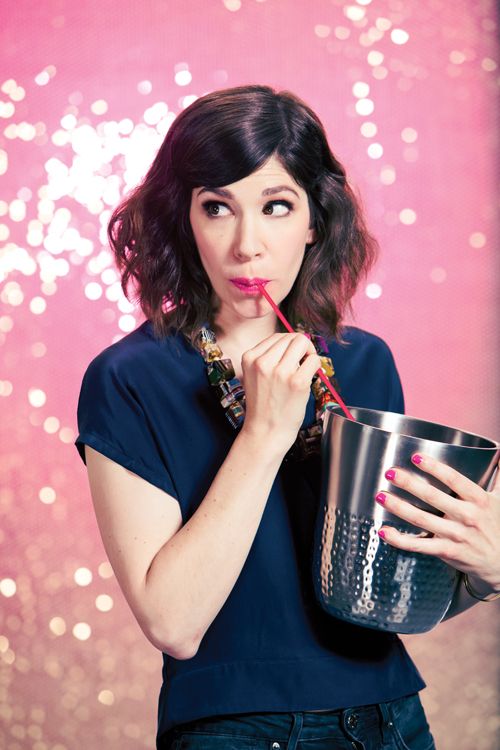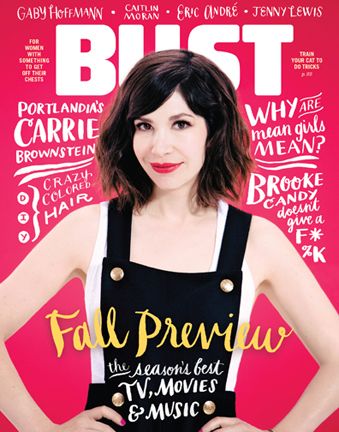From riot grrrl trailblazer in the band Sleater-Kinney to sketch comedy genius on Portlandia, Carrie Brownstein has been cranking out pop culture gems since 1994. Here, the Jill-of-all-trades opens up about fame, Fred, and driving traffic to her fave feminist bookstore.
By Lisa Butterworth
Navy silk top by Wren, wrenstudio.com; Perspex necklace by The Way We Wore, thewaywewore.com
The last time I was in the same room with Carrie Brownstein it was 2006, and she was on stage in San Francisco completely shredding on guitar, maniacally shaking her shag hairdo, and singing intensely over her band Sleater-Kinney’s raucous, urgent rock. The trio, which also included guitarist and singer Corin Tucker and drummer Janet Weiss, had just released what turned out to be their final album, The Woods, and they were tearing through their new songs for an extremely pumped-up crowd. Brownstein hopped and yelped and high-kicked like a true punk goddess, and everyone there to see the impressive group, born from the Pacific Northwest’s riot grrrl scene, bounced right along with her. She was louder and larger than life.
Today, Brownstein’s in a Los Angeles photo studio and she’s not holding a guitar, but rather a gigantic prop toothbrush. It’s almost as tall as she is, and as Ramona, our photographer, snaps away, the 39-year-old brandishes it like an enormous spear, pretends to brush her teeth, uses it to scrub her armpits, and twirls it around like she’s an oral care majorette. She seems tiny. And not just because she’s channeling Lily Tomlin in the 1981 cult flick The Incredible Shrinking Woman, though that certainly helps. Brownstein’s not unusually short, but she is legit petite and low-key. When she goofs off, she does so quietly.
As we chat, seated on a mustard-colored vintage couch at the photo studio, there’s a thoughtfulness to all of her answers. She is quick to smile but more reserved with her laughter, even when she’s exercising her signature wit, which she does when we talk about her BUST cover (“I’m so psyched, it’s like a bucket list thing. Sleater-Kinney was never on the cover. I’m not mad about it. [But maybe you can] superimpose Janet and Corin next to me?”), her happiness over finally giving up on reading the entire literary canon (“I’m like, ‘Wait, I can read A Visit from the Goon Squad? I don’t have to read Flaubert? OK!”), or her forthcoming memoir (“I don’t think it’s a tearjerker, but you never know. That’s gonna be the tagline, like, ‘You’ll cry your way through this…with laughter?’”).
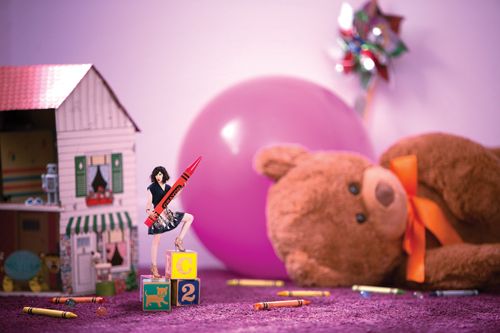
Silk navy top by Wren, wrenstudio.com; Silk pattern skirt by Gemy Maalouf, gemymaalouf.com; Bracelet by Erickson Beamon, net-a-porter.com; Faux leather cut-out heel by Delta by Heart Soul, www.6pm.com; bracelet, Carrie’s own
For many, this is the Carrie Brownstein they’re familiar with—the one who created and stars in the IFC sketch comedy show Portlandia, in which she lovingly skewers her fellow organic-food-loving, fleece-wearing, NPR-listening Oregon residents, alongside her best friend, SNL alum Fred Armisen. Portlandia premiered in January 2011—“Put a bird on it,” from a sketch about avian trends in handcrafted DIY décor, quickly became one of the year’s most oft-repeated catchphrases—and its popularity has increased exponentially. Last season, 3.7 million viewers tuned in to watch characters like the impossibly earnest married couple Peter and Nance; or Toni and Candace—the gals who run the feminist bookstore Women & Women First; or Carrie and Fred, who seem to be a lot like the real-life Brownstein and Armisen, with the added bonus of being super tight with Portland’s mayor (played by Kyle MacLachlan).
[People] just see me as this person they know from television, and then they listen to Sleater-Kinney and they think, ‘What is this scary music? You seem so happy on the show. What’s wrong? Why are you so upset?’”
These days, however, Brownstein is in L.A., Airbnb-ing a house in Laurel Canyon with one of her two dogs (the less adaptable one stayed home in Portland with her house sitter) while writing season five, which will premiere early next year. (Portlandia’s production takes place in its titular town, but all of the writers live in Los Angeles, a testament to the show’s humor having roots in a mindset rather than a specific location.) “I can’t believe it’s season five, that just seems so surreal. It’s like, now I’ve been doing Portlandia for almost half the amount of time I did Sleater-Kinney, and Sleater-Kinney, that just seemed like I did that forever,” Brownstein says. The photo shoot over, she’s back in her street clothes—black jeans and boots, a distressed T-shirt, and a floral panel hat, the brim of which she tugs up and down as we talk. “I think significant changes take longer to settle in as part of your identity. And I guess because Portlandia feels like a newer aspect to my identity and what I do, it still feels fresh.”
Despite having four seasons under her belt, Portlandia, and the accompanying career as a sketch comedian, is new to Brownstein’s identity. But many of her recent fans have no idea what she did before. “It’s weird now, because a lot of people only know me from Portlandia, and can’t believe I was ever in a band,” she says. And not just any band, of course, but one of the most iconic feminist groups of the late ’90s and early aughts. “I’m like, ‘But wait a second, that’s what I did first!’” she says. “They just see me as this person they know from television, and then they listen to Sleater-Kinney and they think, ‘What is this scary music? You seem so happy on the show. What’s wrong? Why are you so upset?’”
At the time Sleater-Kinney was making music, there was plenty to be upset about. Brownstein met Tucker while they were both attending Evergreen State College in Olympia, WA, the epicenter of the riot grrrl movement. They formed Sleater-Kinney, named for an Interstate exit near Olympia, in 1994 (Weiss joined two years later), and quickly gained a devoted following, even among mainstream press (in 1997, they were named one of Spin magazine’s “Top 40 Most Vital Artists” and in 2001, renowned music critic Greil Marcus named them “the best rock band of the year” in Time). When The Woods, Sleater-Kinney’s seventh full-length, came out, they were more popular than ever. But they called it quits shortly after its release, a demise akin to the breakup of the Beatles for those reared on the passion and fury of riot grrrl music. “Creatively, we still felt very relevant. I mean, Sleater-Kinney was lucky, we didn’t ever really have a moment that faltered,” Brownstein says. “We really had a full career. Even though it felt like we ended prematurely, 11 years now seems like a long time to do anything. It’s a whole lifetime.”
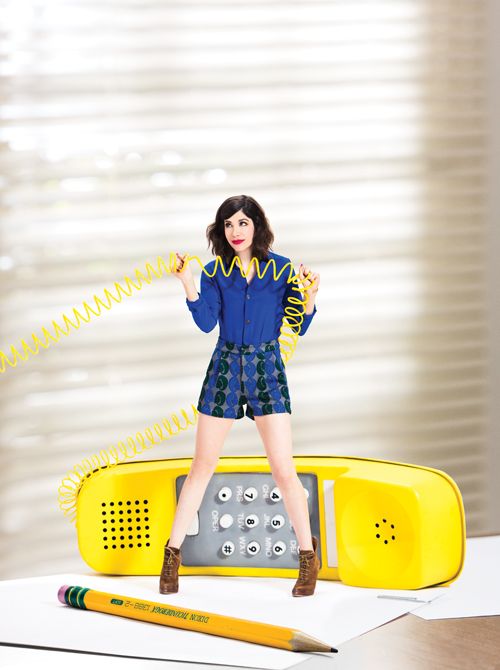
Green and blue Valencia Romper by In My Air, inmyair.com; Shoes by Ask Alice by George Mang, askaliceshoes.com; bracelet, Carrie’s own
Deciding to discontinue what you’ve spent a whole lifetime doing is a terrifying prospect, but as the women got deeper into their 30s, Sleater-Kinney and the lifestyle it required no longer seemed sustainable. Tucker had become a mom, making road life difficult. And despite her ability to rule the stage, Brownstein was fighting crippling anxiety that led to panic attacks and hospital visits. “I just felt like I was touring emergency rooms as much as I was touring clubs and theaters,” she says with a subdued laugh. “I was like, ‘Oh yeah, that Denver ER is great. Oh, the London ER is also pretty nice. Leicester, England? College town? No, not as nice. Kind of a dive, that ER.’” And making such high voltage music—which music writer Ann Powers dubbed “suffragette rock”—took an energy they didn’t necessarily want to put forth anymore. “It was the kind of band that required an insularity and an intensity that’s very hard to maintain,” Brownstein explains, as she absentmindedly removes bobby pins from her messy bob. “In order to keep that galvanizing quality, there has to be volatility. That’s harder as you get older. It’s like, who wants volatility? You start to want things that feel more comforting.”
It took Brownstein a while to figure out what those things were. And emerging from such a high-profile chapter of her life only added to the pressure. “The identity that most people related me to was suddenly going to become something historical. But I want to be measured by what I’m doing now. So what’s next? It was very scary. But it was also a relief,” she says. A short stint at uber-hip Portland ad agency Wieden + Kennedy gave her what she’s called an “existential crisis” before she found a niche as an NPR music columnist and “All Songs Considered” contributor. (It was also during this time that she was named “Volunteer of the Year” for her work with animals at the Oregon Humane Society.)
“The friendships you want to maintain, you really have to protect—not just by commenting on their Twitter feed but by actually, like, inviting them over,”
But it was the web series ThunderAnt that she started working on with Armisen in 2005—the two met at an SNL after party in 2003—that catapulted her into the comedy world she’s so comfortable in now. Brownstein says ThunderAnt was “very clumsy and only partially formed,” but it laid the groundwork for Portlandia, and gave the pair a reason to get together. “Our friendship started in stages because we were on opposite coasts so we didn’t get to spend that much time together. But there was always a shorthand that we had,” she says. “He also came up through music, so we had traversed the same landscape. He’s older than I am [by eight years], but it felt like we had gone down the same paths, sleeping on the same couches on tour. It was almost like we had been going along the same track, so there was an instant comfort.”
That instant comfort only deepened as the two began seeing more of each other. “When we really started to work on Portlandia [in 2009], there just was such a sense of being family and protecting one another. If one of us needed the other person, they would come over any time and spend the night on the couch, you know, during whatever we were going through. And for he and I, we just haven’t had that a lot [in our lives]. So when we realized we each were each other’s constant, it was such a relief.” Spending months on end together filming Portlandia has only strengthened their friendship, and during the writing process, they see each other every day. (In fact, Brownstein says she’s meeting Armisen for dinner after our shoot.) “We are very careful about preserving [our connection]. You have to be kind of intentional about friendships as you get older, because people drift apart so easily with their own lives or families or just physical distance. The friendships you want to maintain, you really have to protect—not just by commenting on their Twitter feed but by actually, like, inviting them over,” she says, laughing. “[You can’t just say] ‘Dude, I liked all of your Instagram photos, so we’re best friends, right? Why didn’t you invite me to your wedding? Every meal you’ve eaten I’ve commented on!’”
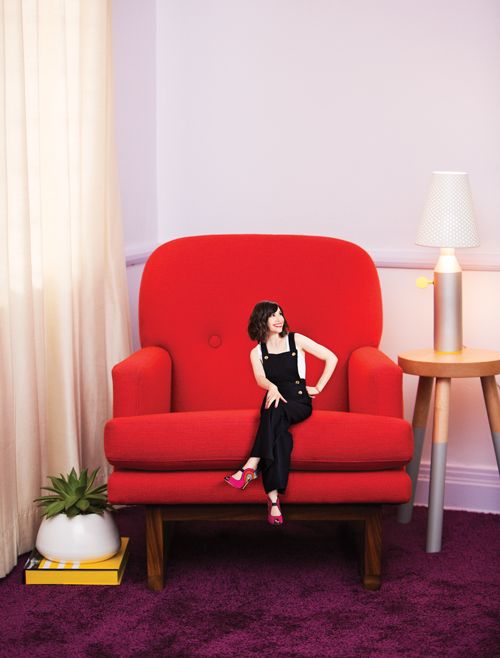
Black wool katya jumper by Kristinit, krisinit.com; white tank by Burning Torch, burningtorch.com; Shoes by Ask Alice by George Mang
It’s this jokiness that makes Brownstein resemble the Carrie of Portlandia more than the one we might remember from Sleater-Kinney, though of course it’s all the same to her. Comedy might seem like a leap from Brownstein’s rambunctious band days, but she assures me it was only a difficult transition for her fans. Her penchant for performing was never exclusive to music; it was a personality trait she’d nurtured since childhood. “I was always putting on plays or going to theater camp or, you know, trying to orchestrate little moments that brought attention to me,” she says. Brownstein grew up in Redmond, WA, and loved watching SNL—Gilda Radner and Jane Curtin especially—and The Kids in the Hall, a show that deeply influenced Portlandia. “Kids in the Hall was so strange,” she muses. “They would air it in blocks on weekends and I would tape them all and re-watch those VHS tapes over and over again. Those sketches were very absurd, all the cross dressing, all the weird voices, all the minutiae they explored.”
It’s that same kind of minutiae that she and Armisen now often explore on Portlandia, driven by characters like Toni (Brownstein) and Candace (Armisen), whose “Feminist Bookstore” segments make Brownstein’s politics most apparent. Dressed in oversized cardigans and peasant skirts, the two say things like, “If you’re not outraged, you’re not paying attention,” and, “Every time you point, I see a penis.” “I think of those characters as superheroes,” she says. “Like, we somehow managed to make two feminists the most popular characters on our show.” In Other Words, the bookstore where those sketches are filmed, has even become a popular tourist attraction. “The fact that people go to Portland to visit a tiny feminist bookstore—no matter what the impetus is for them getting there—the fact that they go in there and look around and shop for books or stationery or whatever, is a major source of pride for me,” Brownstein says. “As a feminist, I just think that’s cool. So even though there’s a silliness to [our sketches] and it’s very pop culture, we also express a multidimensionality that feminism has always embraced, even though people have often tried to make the movement seem less than multidimensional. We show that humor can be part of it, and always has been.”
In fact, under its easily digestible sketch façade, Portlandia has lots of subversive qualities. For example, the characters Nina and Lance are lovers, but Brownstein plays Lance, the man, and Armisen plays Nina, the woman. “Both Fred and I get to explore gender fluidity, and that’s a real bonus of being a performer. You can do that in music too, but to literally bind my breasts and put on a mustache is really fun. When we’re writing the dialogue it’s very liberating,” she says. “I like the way Portlandia feels like a very weird, kind of queer feminist show sometimes. Like when we had k.d. lang, who’s an iconic lesbian artist, hook up with Jason Sudeikis’ character [in season four]. Because our show’s a comedy, we can explore that kind of duality and contradiction, without being too didactic. I really like putting that out into the culture.”
One of the reasons Toni and Candace, and Nina and Lance, and really all the Portlandia characters, inspire such devotion, is because of the obvious chemistry between Brownstein and Armisen, which raised a lot of questions about their romantic involvement when the show first aired. Brownstein has admitted to having an initial crush, but also maintains the two were never an item. But curiosity about Brownstein’s dating life hasn’t waned. In fact, it’s one of the first auto-fills when you Google her name. When I tell her this, she laughs. “Really? Not even, like, Portlandia or something? Jesus,” she says. “Well, yeah, I guess that’s what people want to know. I do notice that when I’m Googling other people [autofill always suggests], ‘dating,’ or ‘feet.’ And I’ll think, ‘OK. I was curious about their feet as well. I’m glad Google will answer this question shortly for me.’”
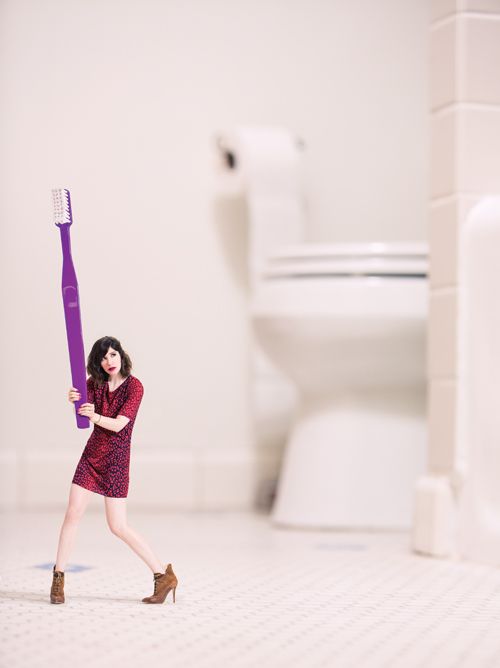
Leopard-print dress by Wren, wrenstudio.com; Booties by Ask Alice by George Mang, askaliceshoes.com
The interest might also be because she’s very particular about keeping her private life private. Though it’s been rumored that she’s dating Portlandia guest star and musician extraordinaire St. Vincent (aka Annie Clark), when her publicist snaps a pic of her on set at our photo shoot, she says that she can use it for her Tinder profile. (Either she was being sarcastic, or every single person in Portland should start swiping immediately). But Brownstein’s not interested in talking about her love life, or anyone else’s for that matter. “It kind of heightens the experiences and maintains a mythical quality to someone’s work, especially music, when I don’t know what they ate for lunch, who they’re dating, or what their favorite beer is,” she says, playing with the delicate gold bangle on her wrist. “I just don’t care. It doesn’t help me enjoy their music.”
It’s no surprise that she keeps her romantic cards close to her chest. Brownstein was burned by media oversharing very early on, and the experience seems to have shaped her reticence with the press ever since. In August 1996, Spin published a profile on Sleater-Kinney, after their second album Call the Doctor was released. In it, the writer outed Brownstein as Tucker’s former lover (as Brownstein told Marc Maron on his WTF podcast in 2012: “Corin and I dated for, like, a second”), when the fact that she sometimes dated girls was something she had not yet discussed with her family. “It was very disorienting,” she says. “We were so excited about that [interview], it was one of the first big articles [about us] so mostly I just was annoyed ’cause it took all the excitement out of the experience. But I think it instilled in me very early on a sense of wanting privacy and not being very interested in having personal information be tantamount to the work itself. Like, it didn’t make anything about that article more interesting at all. Except that I then had to explain a lot of things to my family,” she says with a wry chuckle. “That was interesting.”
When it comes down to it, the work seems to be what Brownstein values the most. Despite her desire for privacy, she’s working on a memoir that will be out next year—though she swears it’s not a tell-all. (“I hate writing. There’s that great Dorothy Parker quote, ‘I hate writing, I love having written,’” she says. “It’s so true.”) In addition to another season of the show, there’s also a Portlandia-inspired cookbook coming out in October. Next year, she’ll make her feature-film debut in the Todd Haynes movie Carol. And, though her most recent band Wild Flag (with Mary Timony, Rebecca Cole, and Janet Weiss) recorded just one album, there’s always the possibility of more music. “That’s always going to be something I love,” she says. “It’s hard because the kind of music I’m drawn to has an urgency to it, so I have to approach it with hunger. It can’t be manufactured. I really have to want it, to need it.” Nothing Brownstein does feels manufactured, and despite how tiny we’ve made her look in our photo shoot, her feminist infiltration of mainstream pop culture is only continuing to grow. “You hear people referencing you or your music as something that really was formative for them, and it just makes you feel lucky,” she says. “‘Cause that’s all you have in the end, you know? You want to pass something on.”
Photographed by Ramona Rosales; styling by Gaelle Paul; hair by Ashley Streicher; makeup by Toby Fleischman. Manicurist: Whitney Gibson. Cover lettering by Monica Garwood.
This interview appears in the Aug/Sept 2014 print edition of BUST Magazine. Subscribe now and get this shit delivered right to your mailbox!!

